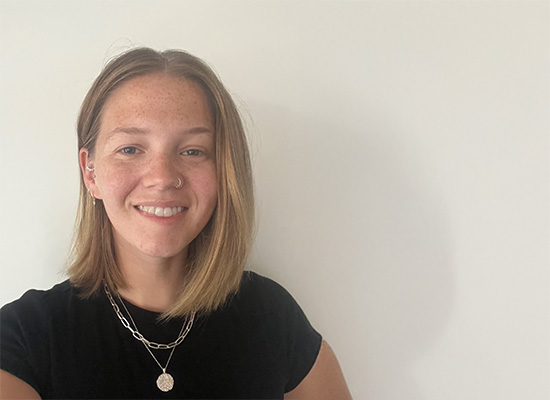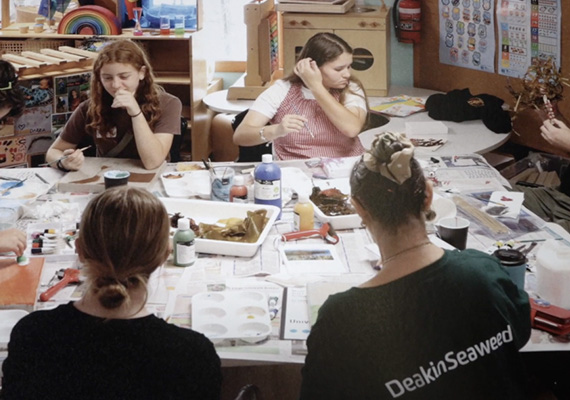
Q&A with Paige Miles
We sat down with Paige Miles a PhD candidate at Deakin's NuSea.Lab and recipient of the Beeton Family Fund PhD Scholarship.
Image: Deakin marine scientist Dr Prue Francis exploring golden kelp forests in the Great Southern Reef. Stefan Andrews, Ocean Imaging.
The modern world has started to take notice of seaweed and its unique and powerful properties but Australia’s First Nations Peoples have understood its value for millennia.
'Cultural knowledge of seaweed was every day, embedded knowledge for Wadawurrung people,' Deakin University PhD candidate Zoë Brittain (Bachelor of Arts '19) explains.
'It’s relevant to food and cooking, medicine, tool creation, creative expression, ceremony and general practices around caring for Country.'
Ms Brittain is a seaweed scientist completing her doctorate at Deakin. In 2024 she collaborated with Wadawurrung Elder Aunty Judy Dalton-Walsh to create a special art exhibition and series of workshops. The Wadawurrung are the traditional owners of what is today known as Geelong and Ballarat.
The program brought together Indigenous and non-Indigenous participants to explore personal, cultural and scientific dimensions of seaweed, expressed through art forms including photography, drawing, sculpture and jewellery.
Ms Brittain is a graduate researcher at DeakinSeaweed – one of the nation’s leading seaweed research centres.

Zoe Brittain dicusses how this exhibition offers a glimpse into the cultural reconnection to seaweed through artworks produced by young Indigenous people living on Wadawurrung Country.
The Director of the Deakin Marine Research and Innovation Centre, Professor Tim Dempster, says seaweed is a 'primary producer'.
'Like plants on land, seaweeds use sunlight and nutrients to photosynthesise and grow. In doing, they capture carbon and mop up nutrients in the water, improving water quality, and producing oxygen. Without seaweeds in the right places and amounts, we lose habitat for fish and other creatures.'
In addition to seaweeds' essential role in marine ecosystems, seaweeds are the basis of pharmaceuticals and many other useful products. Different seaweeds contain a variety of gelatinous compounds in their cell walls (including agar, carrageenan and alginates), which are vital in stabilising and gelling ingredients in many processed foods and other products including ice cream, ham, milk drinks, beer, paint and toothpaste. Medical grade agar comes from a group of red seaweeds.
'This agar is used on agar plates in laboratories to grow bacteria taken from swabs so we can properly diagnose the infectious agent and work out what antibiotic we need to treat it. Without seaweeds, humans would be a lot worse off,' Professor Dempster says.
Professor Dempster fell in love with the ocean while growing up in Queensland, where his family spent their holidays on Minjerribah (North Stradbroke Island) and K’gari (Fraser Island). Today, he inspires the next generation of marine scientists at Deakin’s very own marine base at Queenscliff.
Local resident Dr Sue Beeton is passionate about marine research and has created scholarships specially for Deakin’s postgraduate students.
'In recent years I have had the privilege to visit Antarctica a few times, which has affected me deeply. One team travelling with us was searching for the Colossal Squid and their filming of the ocean floor and creatures was so exciting. On another trip, I joined a citizen science team studying phytoplankton, which introduced me to the wild world of microscopic creatures,' Dr Beeton says.
This was a stark reminder of how important the oceans are, along with how little we know. Living in Queenscliff, surrounded on three sides by water and a research centre at my door, supporting marine science research is a way I can contribute, now and into the future.
Dr Sue Beeton
Image from left to right, top row then bottom row: Zaib Ullah, Benny Yang, Laney Callahan, Courtney Bourke, Billie Julien, Chethana Tissera, Emily Courtot, Sue Beeton, Paige Miles
The Beeton Family Fund supports PhD scholars who are based at Queenscliff and are in their final year of study. The aim is to alleviate financial stress and encourage the publication of vital research. Fifteen emerging researchers have been assisted thus far.
For Dr Beeton, supporting the outstanding PhD students at Deakin’s Marine Science and Innovation Centre has been truly inspiring and meaningful.
'The support and wiggle-room that this funding provided brought a genuine sense of relief and empowerment,' recipient Lucy Coals says.
Professor Dempster’s current research projects include better understanding sea urchins, which are a major pest in southern Australia because they destroy seaweeds and kelp. He has experienced first-hand the difference that a timely funding boost can make.
'Philanthropy has a special role to encourage new ideas and approaches that are emerging in prominence, and require seed funding to demonstrate early results. There are many examples of the substantial impact philanthropy has had in this way,' he says.
In the face of growing environmental challenges, Professor Dempster remains optimistic about the future of our oceans.
'I can appreciate that many would view our global outlook as daunting with such rapid change before us. Yet there are so many instances of projects and programs in the marine conservation and restoration space that have significant benefits and are turning the tide back in the right direction.'
'All have started as concepts driven by a passionate individual or small group of researchers and, with the right support, have grown into important projects with impact. The only way is to dive in.'

We sat down with Paige Miles a PhD candidate at Deakin's NuSea.Lab and recipient of the Beeton Family Fund PhD Scholarship.
I have always been a lover of the ocean. From a young age, I was fascinated with marine life and would make every effort to immerse myself in that environment. This passion has extended to my studies where I developed a deeper appreciation for the science that underlies what we see along our coastlines and beyond.
Over the course of my candidature, I have been exploring the influence of both pellet properties and diet formulation on the gut transit rate of Atlantic salmon. The objective is to find sound dietary solutions for cultured fish, such as those farmed in Tasmania, who are susceptible to negative impacts of ongoing heat stress. Given future climate projections, it is of the utmost importance that we seek out viable solutions to secure the future of the industry and maintain animal welfare.
Very simply, I would like to see the industry shift to more sustainable practices that are informed by research. The aquaculture industry is an essential sector to ensure food security, however, this should not come at the expense of the environment. Fortunately, there is a great deal of both interesting and impactful work being conducted that is exploring ways in which we can improve all aspects of the industry.
Initially I was very shocked! Once I came to learn who was supporting us (our local community member Sue) I was overcome with a feeling of gratitude and relief. The scholarship will alleviate the stress that comes with completing your PhD and entering the work force, especially with the demands of full time work and study being impossible. Sue's support means that I can continue to focus on my writing, and subsequent thesis submission, without the overwhelming pressure of ensuring my financial security. This is such an incredibly generous donation, and I am so appreciative that I am a recipient - that someone like Sue believed in me and my work.
Deakin Marine Research and Innovation Centre is Victoria's leading university-based marine centre. Their unrivalled research breadth and expertise drives transformational outcomes for ocean-based economies and the environment. Learn more about their incredible work.